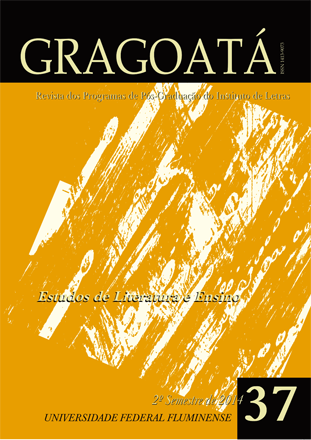SOME CONCEPTS OF THE BAKHTINIAN DIALOGIC THEORY OF DISCOURSE AND THE LITERATURE TEACHING
DOI:
https://doi.org/10.22409/gragoata.v19i37.32999Keywords:
Literature teaching, Dialogism, Concrete utteranceAbstract
This article - part of the postdoctoral project A Bakhtinian theoretical and methodological approach of the literary collection of the National Program School Library (PNBE) / 2013 for high school – aims to show the relevance of some concepts of Bakhtin’s theory of discourse for teaching literature. In working with literature in the classroom, if we want to face the evils of its inadequate schooling (SOARES, 2011), it is important to understand concepts such as dialogism, which helps to address the different stylistic and axiological layers of the artistic discourses in general, not only of the literary ones. Working didactically with the notion of “dialogic construction” of the literary discourse means to form readers able to notice the nuances of the polysemic text, who can build interpretations of it according to their world view and knowledge, who can make “aesthetic and / or affective” appreciations with confidence and develop “appreciations on ethical and / or political values” (ROJO, 2004). Under Bakhtin’s perspective, it is understood that communication is done through the concrete utterance comprising two parts: the part perceived or performed on words and the assumed part - the spatial and ideational horizon shared by speakers; its distinctive feature is that it provides a myriad of connections with the extra verbal context of life (BAKHTIN, VOLOSHINOV, 1976). The understanding of the concept of concrete utterance contributes to the teacher perceives the question of ideology from the Bakhtinian point of view - everything that involves the worldview and its value scale. This notion allows us to see the positive and negative values that run through all the discourses and constitute them as discourses from different social voices.
Downloads
Downloads
Published
How to Cite
Issue
Section
License
Authors who publish in Gragoatá agree to the following terms:
The authors retain the rights and give the journal the right to the first publication, simultaneously subject to a Creative Commons license CC-BY-NC 4.0, which allows sharing by third parties with due mention to the author and the first publication by Gragoatá.
Authors may enter into additional and separate contractual arrangements for the non-exclusive distribution of the published version of the work (for example, posting it in an institutional repository or publishing it in a book), with recognition of its initial publication in Gragoatá.

Gragoatá is licensed under a Creative Commons - Attribution-NonCommercial 4.0 International.














